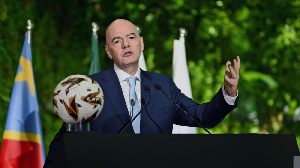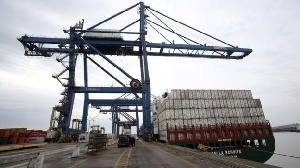In the first of a series of interviews with businessmen and influential people in Ghana’s burgeoning business community, GhanaWeb spoke to Sam Ato Gaisie, organiser of the recent UT Entrepreneur Awards and founder of the Entrepreneurs Foundation of Ghana (EFG).
Sam Ato Gaisie is adamant about one thing when it comes to moving Ghana’s economy forward: business must be separate from politics.
“With the experience I have, politics is a big part of some of the hindrances Ghanaian businesses face. When a government comes in, individuals rise under the auspices of that government, but when there is a change in government there is a problem for that person – he cannot move his business forward,” said Mr Gaisie, who has extensive experience in business and qualifications in marketing, sales and business administration. His drive to inspire and recognise entrepreneurs led him to set up EFG.
Mr Gaisie launched the EFG awards, in collaboration with UT Bank, to honour the best and brightest Ghanaian entrepreneurs. But he says that now the awards have been handed out and the glamour of the awards night is over, this is when the hard work really starts. The awards, he says, serve to motivate business people to strive for better results and make an impact on Ghana’s economy.
“It’s back to business,” he says matter-of-factly now that the awards have come and gone.
“We expect the award winners to come together and move the economy forward. It is based on their contribution to business that they were given the award – if someone is given an award they have to move forward.”
Mr Gaisie is emphatic, however, that it is not only Ghanaian business owners who have to be serious about business in Ghana but the government too.
“We have to be business-minded – forget politics… Bill Gates, one of the most powerful business people in the world, hasn’t had any problems with any government over the years. In Ghana you are harassed, you have to bring your books… If these things happen, you are not only destroying the person, you are destroying the economy.”
High interest rates, poor energy supply and lack of cohesion between the public and private sector are also major challenges to business, according to Mr Gaisie who has had many experiences in dealing with the public sector.
“The public sector is not helping the private sector. If you work with the public sector and a cheque is due for collection, you have to chase it for several weeks, for example. The way big institutions and ministries work is a problem,” he said.
“If you look at the public sector, it is also not employing a lot of people… even though it is taking up 60% of the government’s revenue in wages. When people come out of school they don’t have jobs,” this he says, is where entrepreneurship kicks in.
“ Will you wait until you are 40 years old to start your own business?” he asked rhetorically.
“When you leave school you have the energy to start your own business. When you leave school you have a lot of opportunities and contacts.”
This, he says, is the time for young people to get into business and start making money for themselves. If not, he says, before you know it you are 30 years old and still trying to climb the ladder meanwhile companies are looking for younger graduates.
A recent report from the National Council for Tertiary Education (NCTE) found that there are no jobs for 40% of graduates meaning many will be forced to look towards starting their own businesses to make a living. According to the report, Ghana is churning out more qualified graduates than ever before but the job opportunities are not growing at the same rate. This means that around 22,500 of them will face unemployment this year.
But Mr Gaisie sees this as a opportunity rather than a negative – even though starting out as an entrepreneur isn’t easy.
“If you want to be an entrepreneur, risk-taking is involved, you have to take risks before you make it. You need to start, there are impediments but you need to move on,” he said emphatically.
“As you want to be an entrepreneur you need to start somewhere. There are a lot of ways to be make money in this country.
“If you look at Forbes (business magazine) we have Africans from everywhere featured there but there is no Ghanaian. In boxing and football we are there but in business we are not there.”
So, does Mr Gaisie think that 2012 UT award winner, Mr Roland Agambire, is a good role model for budding entrepreneurs in spite of the recent controversies surrounding the prominent businessman? He says that this comes back to taking the business out of politics.
“Mr Agambire’s nomination was based on 2012 achievements. If there are controversies, are they business or political? We are doing business. If people have the entrepreneurial spirit not just to move their business but the countries forward, we have to support them,” he said.
“We looked at the financial facts and entrepreneurial spirit and judged him on that. We realised that he has been doing well, during the Cup of African Nations he sponsored the whole telecast. How many companies can do that?”
So, what is the way forward for Ghana? How can the country become an economic powerhouse in Africa? According to Mr Gaisie companies need to stop isolating themselves and partner up to take advantage of one another’s strengths. And the private and public sectors must work together to industrialise Ghana and move it forward. Most of all, companies must have faith in qualified young people – they are the ones who can move companies, and ultimately the economy, forward.
Mr Sam Ato Gaisie spoke to GhanaWeb reporter Miriam Yentumi. The next Entrepreneur Foundation of Ghana (EFH) awards will be the Made-in-Ghana Awards which will take place in October 2013.
For a full list of winnders and to read more about the 3rd UT Ghana Entrepreneur Awards click here.
Business News of Tuesday, 14 May 2013
Source: www.ghanaweb.com
FEATURE: Let's take politics out of business

Opinions











